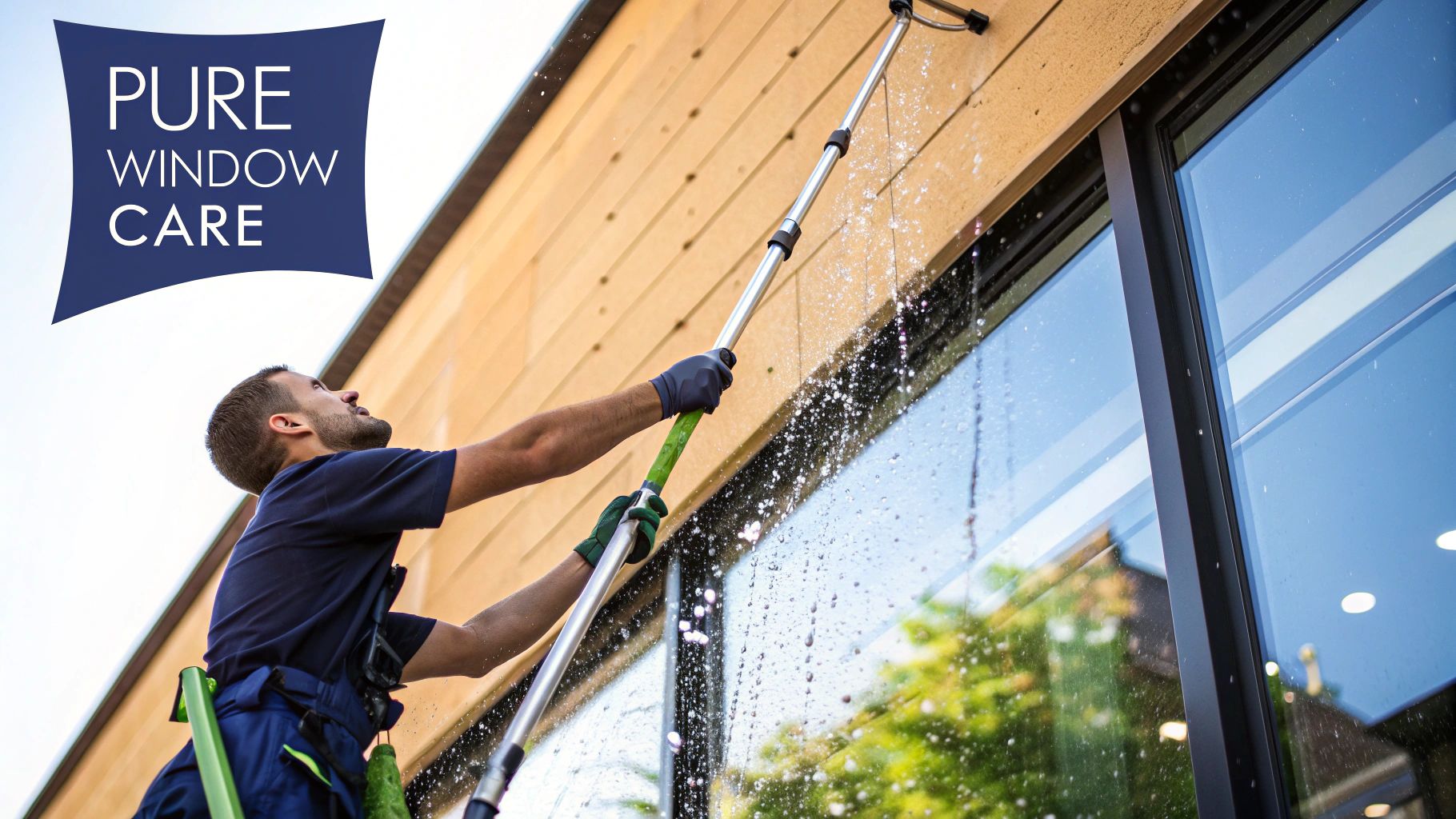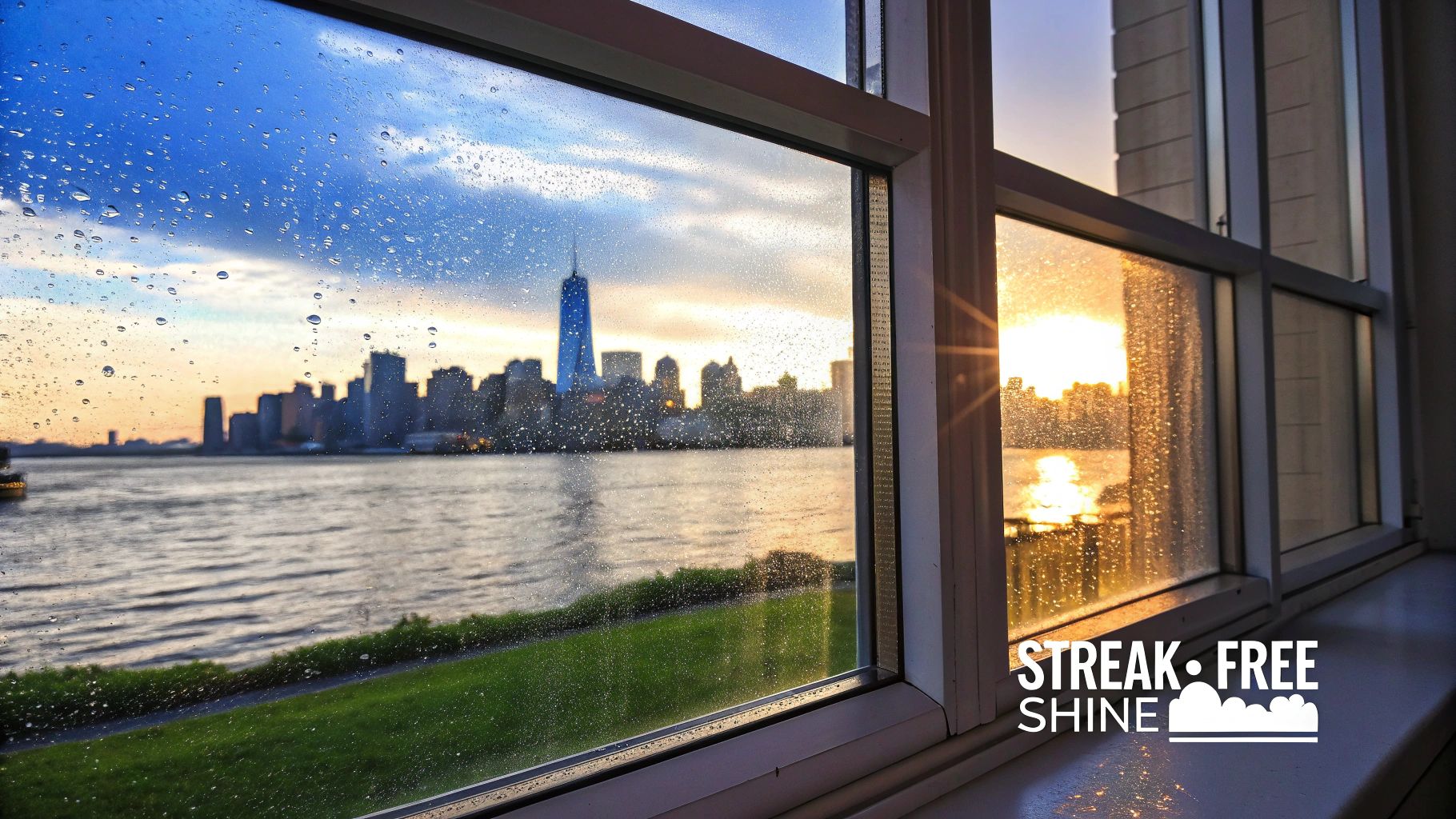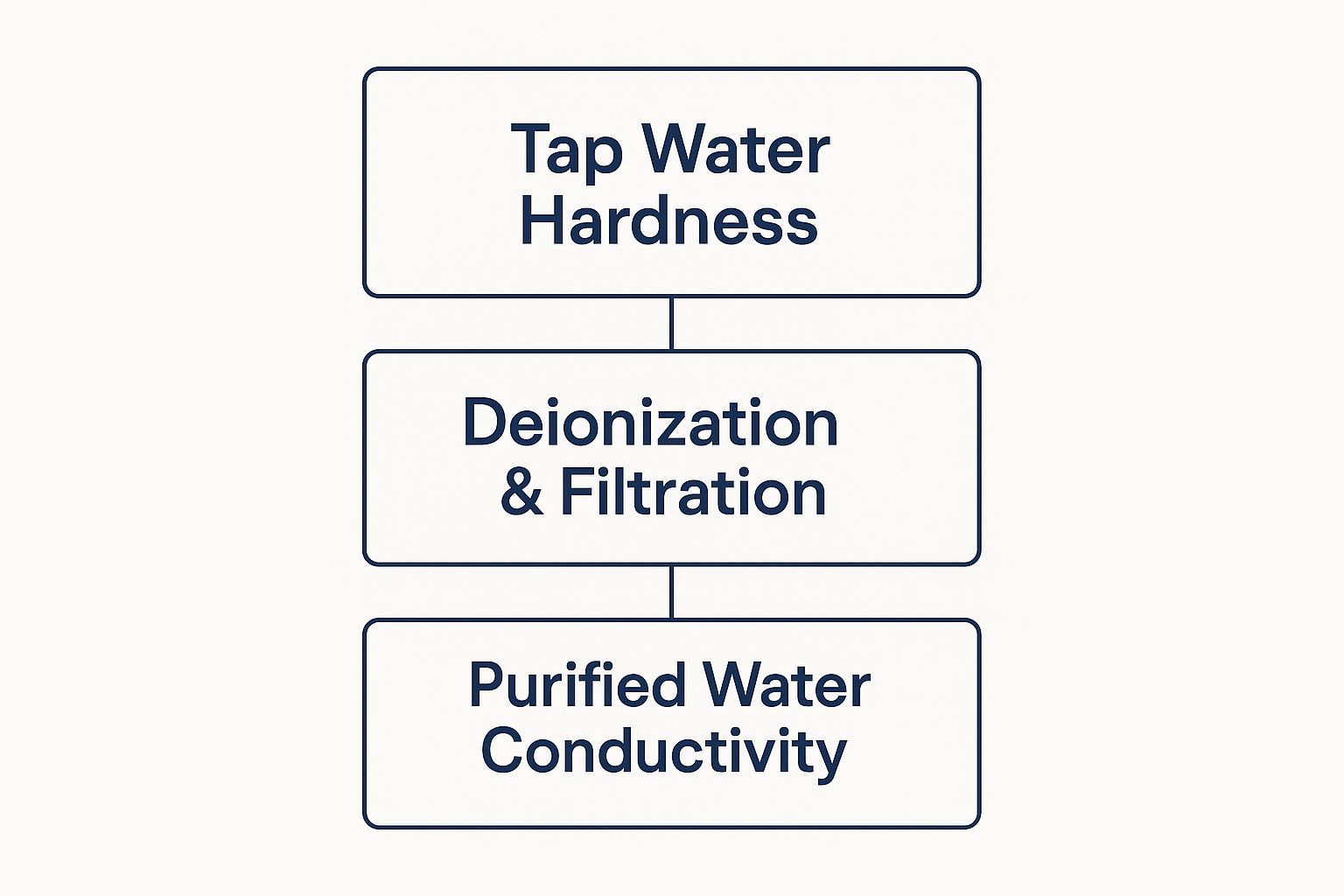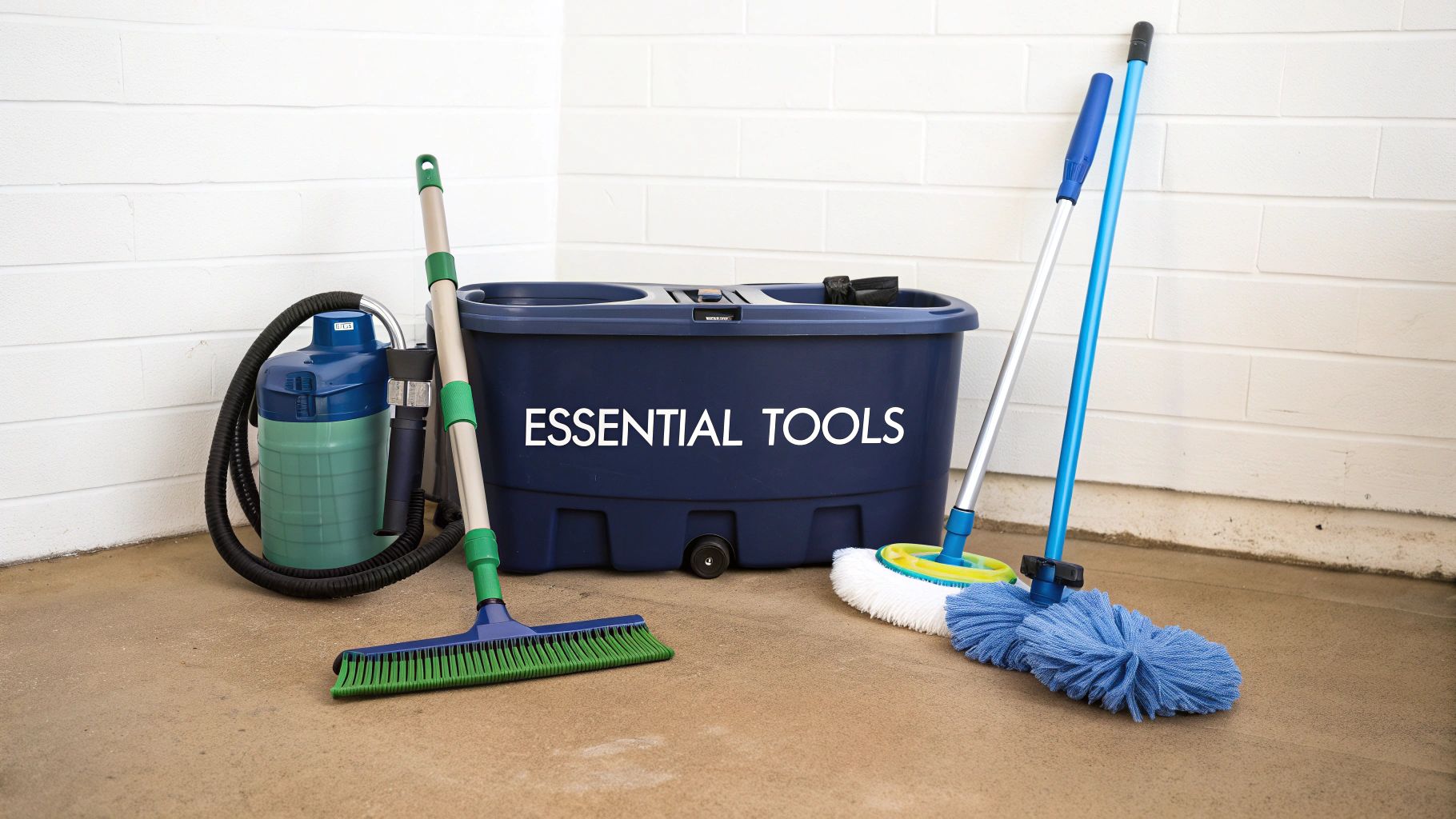Ever wondered how professional window cleaners get that perfect, streak-free finish every single time? For many, the secret isn't in the squeegee technique—it's in the water itself.
A pure water window cleaning system is a modern approach that swaps out soaps and chemicals for highly purified water. This method gets rid of every last mineral and impurity, letting the water do all the hard work to leave glass spotless.
What Is Pure Water Window Cleaning

Think about what happens when you wash your car with regular tap water and let it air dry. You're often left with little white spots, right? Those are mineral deposits like chalk and lime that were left behind after the water evaporated.
Pure water window cleaning is designed to completely avoid that problem. It all starts with a sophisticated purification process that strips tap water of all these total dissolved solids (TDS). What you're left with is water in its most natural, demineralised state.
This ultra-pure water is then pumped up a long, telescopic pole—often called a water-fed pole—to a specialised brush at the end. This clever setup allows a cleaner to work safely and efficiently from the ground, reaching even high-level windows without ever needing a ladder.
The Secret to a Streak-Free Finish
So, where does the magic really happen? It's all down to chemistry. Because the water is so pure, it acts like a magnet for dirt. It actively pulls grime, dust, and other residues off the glass surface.
After a gentle scrub with the brush, the window is given a final rinse with the same pure water. The impurities are simply washed away, and the window is left to dry naturally.
The key takeaway is simple: when pure water evaporates, it leaves absolutely nothing behind. No minerals, no residue, and most importantly, no streaks.
This highly effective method has taken the UK by storm. The industry now generates over £250 million a year, with much of that success driven by the efficiency of water-fed pole systems. Plus, by ditching detergents, it's a far more environmentally friendly way to get the job done. You can find more details on the growth of pure water systems from this industry report.
The Science Behind a Streak-Free Shine

Ever washed your car or windows with tap water and noticed those chalky white spots left behind after it dries? Those are the calling cards of dissolved minerals, mainly calcium and magnesium, that are present in all our tap water. A pure water window cleaning system is designed to eliminate this exact problem before the water even touches the glass.
Once the water is pushed through the filtration system, it's stripped of all these minerals. It becomes 'demineralised' and enters what you could call a 'hungry' state. Think of it like a sponge—this pure water is so eager to return to its natural, mineral-rich state that it actively grabs onto any dirt, dust, pollen, and grime it finds on the window.
This natural desire to bond with other particles is so effective that you don't need any soap or chemical detergents. The process on the glass is simple: the pure water is fed through a brush, which gently agitates the dirt. The water then absorbs the grime, and a final rinse carries it all away.
How It Dries Spotlessly
The real trick to the whole system is what happens when the water dries. Because the water is 100% demineralised, there’s simply nothing left to leave behind when it evaporates. No minerals to create spots, and no soapy film to cause streaks.
At its heart, the principle is incredibly straightforward: remove everything from the water first, so nothing is left on the glass later. This gives you that crystal-clear finish that even stays cleaner for longer, as there's no sticky soap residue to attract new dust.
This idea of purity is a cornerstone of professional cleaning. In fact, many techniques for achieving a streak-free clean on glass surfaces are based on similar concepts of removing impurities and residue.
Ultimately, the science is simple but the results are remarkable. By harnessing the natural properties of water, the system turns a basic liquid into a powerful cleaning agent that delivers a flawless, professional finish every time, without any added chemicals.
Traditional Cleaning vs Pure Water System
To really see the difference, it helps to put the old and new methods side-by-side. The traditional bucket-and-squeegee approach has served well for years, but pure water systems offer some clear advantages in efficiency, safety, and results.
| Feature | Traditional Method (Soap & Squeegee) | Pure Water System |
|---|---|---|
| Cleaning Agent | Soap or chemical detergents mixed with tap water. | 100% pure, demineralised water. |
| Process | Apply soapy water, scrub, then squeegee off the residue. | Agitate surface with a soft brush and a constant flow of pure water, then rinse. |
| Drying Method | Relies on expert squeegee technique to avoid streaks. | Dries naturally to a spotless, streak-free finish. No squeegee needed. |
| Reach & Safety | Often requires ladders or lifts for high windows, increasing risk. | Water-fed poles can reach up to 80 feet from the safety of the ground. |
| Environmental Impact | Uses detergents that can run off into the ground. | Completely chemical-free and eco-friendly. |
| Result | Can leave behind a microscopic soap film that attracts dirt. | Leaves glass perfectly sterile; stays cleaner for longer. |
As you can see, while both methods aim for clean windows, the pure water system streamlines the process, enhances safety, and provides a superior, longer-lasting clean by working smarter, not harder.
Getting to Know the Gear: A Look Inside the System
To really get what makes pure water window cleaning so effective, it helps to pop the bonnet and see what’s running the show. This isn't just a fancy hose and brush; it's a sophisticated setup where every piece has a specific job, all working together to turn your everyday tap water into a dirt-busting powerhouse.
Let's break down the essential bits of kit that work in harmony to deliver that flawless, streak-free shine.
The Heart of the System: The Filtration Unit
The real magic happens inside the multi-stage filtration unit. This is the workhorse that strips tap water of all the dissolved minerals and impurities – the very culprits behind those frustrating spots and streaks left by traditional methods. Most professional setups use a powerful one-two punch to get the job done.
- Reverse Osmosis (RO): First, high pressure shoves the water through a special membrane. You can think of it as a microscopic strainer so fine that it blocks up to 98% of all dissolved solids from passing through.
- Deionisation (DI): For the final polish, the water flows through a tank filled with special resin beads. These beads act like magnets for any lingering mineral ions, grabbing them and leaving the water 100% pure.
This process radically changes the water's properties, making it an incredibly effective cleaning agent.

As you can see, the journey from tap to pure is all about stripping out the conductivity – the scientific measure of its impurity. To get even more detail on the science, you can see https://24purewater.co.uk/how-it-works/. For mobile cleaning crews, secure water transport is also a big deal, and having an understanding of polyethylene storage tanks is key to a reliable setup.
The Reach: The Water-Fed Pole
Once the water is purified, it needs a way to get to the glass. That's where the water-fed pole comes in. These are incredibly lightweight, telescopic poles, usually made from carbon fibre or fibreglass, that can stretch up to a massive 80 feet.
This incredible reach means professional cleaners can tackle windows several storeys high while keeping their feet safely on the ground. Ladders and scaffolding are quickly becoming a thing of the past.
The Business End: The Brush Head
Fitted to the end of the pole is a purpose-built, soft-bristled brush. Its job is to gently agitate the surface, loosening stubborn grime, dust, and bird mess from the glass, frames, and sills without leaving a single scratch.
All the while, jets in the brush are constantly flowing with pure water, washing away all the dislodged dirt. The window is simply left to air dry, and because the water is completely pure, it evaporates without a trace, leaving nothing behind but a perfect, crystal-clear finish.
What Are the Real-World Benefits for Your Property?

So, we've talked about the science, but what does all this actually mean for your home or business? When you get down to it, using a pure water window cleaning system brings some fantastic, tangible benefits that really set it apart from the old bucket-and-squeegee method.
The most obvious difference is the quality of the clean. It’s simply superior. Because there’s no sticky soap residue left behind, dirt and grime have nothing to cling to. This means your windows don't just look pristine; they stay that way for much longer, giving your property a real boost in kerb appeal.
It's no surprise this method is taking off. The UK window cleaning market is growing at a healthy clip, with a projected compound annual growth rate of around 5.9%. This growth is driven by people wanting smarter, more effective, and greener solutions, which is exactly what pure water systems deliver. You can dig deeper into the trends shaping the UK window cleaning industry to see where things are headed.
Safer and More Efficient
One of the biggest plus points, and one that's often overlooked, is the huge leap in safety. The water-fed poles can reach several storeys high, all while the cleaner's feet are planted safely on the ground. This takes ladders—and the risks that come with them—completely out of the equation.
Working from the ground isn't just safer; it's also a lot faster. Without the constant need to move and reposition ladders, the job gets done far more efficiently. For you, that means less disruption and a quicker turnaround.
The system allows professionals to clean windows, frames, and sills in a single, fluid motion, accessing hard-to-reach areas like windows above conservatories with total ease.
The Eco-Friendly Option
Choosing pure water cleaning is also a fantastic way to do your bit for the environment. The entire process works its magic without using a single drop of harsh detergent or chemical.
This means there's no soapy runoff to pollute your garden, drains, or local waterways. It’s a powerful clean that’s completely safe for your plants, pets, and family, making it the smart and sustainable choice for any modern property.
More Than Just Windows: Where Pure Water Really Shines
You might think a pure water window cleaning system is just for, well, windows. But its real value lies in just how versatile it is. While it leaves glass with an incredible sparkle, its use extends far beyond that, making it a fantastic tool for keeping your entire property looking its best.
This isn't just about cleaning one thing; it's about having a single, effective solution for multiple problems. Think about the green algae that loves to grow on conservatory roofs or the traffic film that makes commercial signs look tired and faded. The combination of purified water and a gentle brush is powerful enough to shift the grime, yet safe enough for delicate surfaces.
Bringing Your Property's Exterior Back to Life
The magic is in the reach and precision of the water-fed pole. It lets you tackle jobs that would otherwise be a real headache or involve harsh, potentially damaging chemicals.
Here’s where it really proves its worth:
- Conservatory Roofs and Skylights: It gently lifts away moss, algae, and built-up dirt from glass or polycarbonate panels. You don't have to worry about scratching the surface or damaging the seals.
- uPVC Fascias, Soffits, and Cladding: That brilliant white uPVC can quickly look grubby. Pure water cleaning strips away stubborn dirt and discolouration, giving your property an instant facelift and boosting its kerb appeal.
- Commercial Signage: A clean, bright sign makes a great first impression. This method is perfect for cleaning plastic, metal, or vinyl signs, keeping your business looking professional and welcoming.
No matter the surface, the principle is the same. The pure water acts like a magnet for dirt, pulling it away. The soft brush helps to agitate it, and a final rinse washes it all away, leaving the surface to dry completely spotless.
Maximising Your Solar Panel Efficiency
One of the most important and valuable uses for pure water is cleaning solar panels. It's easy to forget, but a thin layer of dust, pollen, or bird droppings can seriously dent their energy output. The problem is, cleaning them with regular tap water or chemicals just makes things worse by leaving behind a mineral film that blocks sunlight.
Pure water is the only real answer. It washes away every speck of dirt without leaving a single residue, ensuring your panels can absorb the maximum amount of sunlight and run at peak efficiency.
If you want to dive deeper into this, we have a detailed guide on professional solar panel cleaning. It’s not just about getting them clean; it’s about protecting your investment and making sure you’re getting the energy savings you paid for.
Common Questions About Pure Water Cleaning
Even after seeing how it all works, you probably still have a few questions about what pure water cleaning looks like in practice. That’s perfectly normal. We’ve pulled together some of the most common things people ask, so you can get a better feel for how it all works on a day-to-day basis.
Let's clear up those last few bits of uncertainty.
Is Pure Water Cleaning Safe for All Window Types?
Yes, completely. Because the system only uses purified water and a soft-bristled brush, it’s incredibly gentle. This makes it a perfect match for any kind of glass, from old, delicate panes on a period property to modern windows with special anti-glare or self-cleaning coatings.
There are no harsh chemicals involved, which means there's zero risk of damage to your wooden or uPVC frames, rubber seals, or the surrounding stonework. It’s a safe bet for any building, old or new.
Can I Use a Pure Water System Myself?
While you can buy small kits for home use, the professional-grade systems are a different beast altogether. They’re a serious investment and require a fair bit of training to get right, especially when you’re trying to reach windows on upper floors. The technique is just as important as the water itself.
For that perfect, streak-free shine, it’s always best to call in a professional. They have the right equipment and the experience to deliver a flawless finish every time. For a deeper dive, take a look at our full list of frequently asked questions about pure water systems.
The key difference lies in consistency. Professionals use TDS meters to ensure water purity is at 0 parts per million (PPM), a standard that’s difficult to achieve and maintain with DIY equipment.
How Often Should Windows Be Cleaned This Way?
For most homes here in the UK, getting a professional clean every 2 to 3 months is usually enough to keep your windows looking great and stop grime from building up.
That said, if your property is near a busy road, by the coast, or in an industrial area, you might want to clean them more often. In those cases, a clean every 6 to 8 weeks helps tackle the extra dust, salt spray, and pollutants.
Does It Really Work in the Rain?
This one surprises a lot of people, but yes, it does! Rainwater itself is naturally very soft, almost pure, unlike the tap water that causes spotting. Once our process has scrubbed all the dirt away from your glass, a bit of rain just runs right off without leaving any new marks.
This means a professional clean can often go ahead in light rain without affecting the results. Your appointment is much less likely to be called off because of the famously unpredictable British weather!
Ready to experience the future of cleaning? 24 Pure Water provides ultra-pure, demineralised water from self-service filling stations across the UK, helping professionals achieve that perfect finish. Find your nearest station and top up today at https://24purewater.co.uk.
